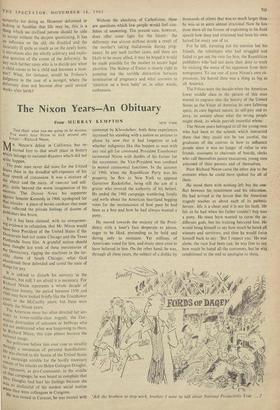The Nixon Years An Obituary
From MURRAY KEMPTON NEW YORK 'Just think what you are going to he missing. You won't hare Nixon to kick around any longer!--Richard Nixon.
MR. NIXON'S defeat in California has re- moved him to that small place in history Which belongs to national disasters which did not quite happen. The poor man never did more for the United 'mates than in the dreadful self-exposure of his final speech of concession. It was a mixture of the abject and the nasty. of rancour and self- iitY, quite beyond the worst imagination of his enemies. The Detroit News, his supporter against Senator Kennedy in 1960:apologised for rrbat mistake: a piece of heroic candour that must have reflected the private feelings of dozens of Publishers less brave.
, 'Yet it has been claimed, with no overpower- ing evidence in refutation, that Mr. Nixon would have been President of the United States if the b ,.‘ entoerats had not stolen Chicago and the Texas
have from him. A grateful nation should
thought last week of these mercenaries of the Democracy, rigging the machines in the ter- rible slums of South Chicago; what God abandoned these defended and saved the state of things for pay.
Shadows, is unkind to disturb his memory in the `..,n.adows, but still, I am afraid it is necessary. For Richard Nixon represents a whole decade of American history; the period between 1950 and
'60 may have looked briefly like the Eisenhower Years or the McCarthy years; but these were Clearly the Nixon years. v The American muse has often directed her ser- 2uts to lower-middle-class tragedy, the Dar- dw.inian destruction of salesmen or bellboys who Itilil not understand what was happening to them.
national Nixon, this type almost became the "ational image.
l\le Politician before him ever rose so steadily through a succession of personal humiliations. He was elected to the Senate of the United States .,„ a campaign notable for the hardly necessary v °111 of his attacks on Helen Gahagan Douglas, ii-in3 ulaPonent, as pro-Communist; in the middle 41[ that campaign, he was heard to complain that jvi rs' Douglas had hurt his feelings because she Was so disdainful of his modest social station ve_ "en they were colleagues in Congress.
He was stoned in Caracas; he was treated with contempt by Khrushchev; both these experiences increased his standing with a nation so anxious to please by now that it had forgotten to ask whether indignities like this happen to men with any real gift for command. President Eisenhower tormented Nixon with doubts of his favour for the succession; the Vice-President was confined to menial ceremonial functions. In the summer of 1960, when the Republican Party was his property, he flew to New York to appease Governor Rockefeller, being still the son of a grocer who revered the authority of his better. He ended the 1960 campaign wandering limply and wetly about the American heartland begging votes for the reminiscence of how poor he had been as a boy and how he had always Wanted a pony.
He moved towards the majesty of the Presi- dency with a loser's face desperate to please, eager to be liked, pretending to be bold and daring only to insinuate. Yet millions of Americans voted for him, and many seem even to have believed in him. On the other hand, he was, through all these years, the subject of a dislike by thousands of others that was so much larger than he was as to seem almost irrational Now he has done them all the favour of explaining in his final speech how deep and irrational had been his own hatred for every one of us.
For he left, damning not his enemies but his friends, the volunteers who had struggled and failed to get out the vote for him, the Republican publishers who had not done their duty to truth by excising the name of his opponent from their newspapers. To use one of poor Nixon's own ex- pressions, his hatred then was a thing as big as all America.
• The Fifties were the decade.when the American lower middle class in the person of this man moved to engrave into the history of the United States as the Voice of America its own faltering spirit, its own bigoted nature, its self-pity and its envy, its anxiety about what the wrong people might think, its whole peevish resentful whine.
The Nixon years belonged to all the young men who had been to the schools which instructed them that they could not be too careful, the graduates of the courses in how to influence people since it was no longer of value to win friends, assistants to chairmen of boards, clerks who call themselves junior executives, young men ashamed of their parents and of themselves.
Poor Richard Nixon came the other day to the moment when he could have spoken for all of them.
He stood there with nothing left but the con- flict between his resentment and his education. He had arrived at the lesson that the American tragedy teaches us about each of its pathetic heroes: life is a cheat and it is not his fault. He felt as he had when his father couldn't buy him a pony. He must have wanted to curse the in- different gods, but his training betrayed him. He would bring himself to say how much he hated all winners and survivors, and then he would force himself back to say: 'But I respect you.' He was alone, the race had been run; he was free to say how much he hated all the customers, but he was conditioned to the end to apologise to them.
'Ask the brothers to stop work, brother; 1 want to talk about National Productivity Year. . :






































 Previous page
Previous page